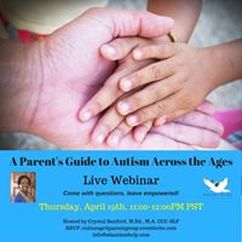 Have you had "the talk" with your child? I am referring to a discussion about your child having Autism 😉. Many Autism parents like myself begin to contemplate having "the talk" as our children enter the mid years of elementary school. Others wait until adolescence or young adulthood. Let's briefly discuss the pros and cons... Pros: Disclosing to your child can be empowering for them. It can help them make sense of their known strengths and challenges. Disclosure can also support your parent/child relationship. Many individuals diagnosed with Autism as adults report feeling resentful towards their parents initially because their parents did not address the issue early on. Cons: Disclosure could initially evoke feelings of fear, anger or sadness. Also, older children could begin to use the diagnosis as an excuse for certain behaviors. Tips:
As you already know, each child with Autism is an awesome individual, to say the least. That being said, what works for one child or family may not work for yours. As you contemplate talking to your child about Autism, be encouraged! Trust your gut and make the decisions that work best for your child/family. Remember that clinicians and fellow Autism parents like myself are here to assist. Feel free to reach out for more information... References: Indiana Resource Center for Autism (www.iidc.indiana.edu)
0 Comments
 Are meltdowns common at your house? It has definitely gotten better for us now that my daughter is seven. But, when she was younger, we experienced our fair share of meltdowns. These extreme reactions to small problems are typical for children on the Autism spectrum. Why? Likely due to challenges with emotional/self-regulation. Emotional regulation is the ability to monitor and control our behavior or emotions and adjust them based on the situation. For example, when we are well regulated we can cheer ourselves up when we’re sad and calm ourselves down when we’re upset. So, why do our kiddos with Autism struggle so much in this area? One reason is that individuals with Autism typically have challenges with executive functioning skills. These skills are controlled by the frontal lobe of the brain and help us to use past information to make action in the present. Executive function skills include: shifting attention, flexible thinking, inhibiting emotions and organizing/planning. Individuals with Autism also tend to have poor working memory skills and sensory sensitivities. The combination of these challenges makes it very hard to navigate the requirements of daily life and stay emotionally regulated. What can parents do to help? 1. Observe your child: Simple, but not really. Without intervening, watch how they handle the daily stressors of life. What behaviors are they currently using to cope? This will be helpful to know as you assist them in developing a plan for using more productive and "expected" behaviors. 2. Size of the Problem: Discuss the daily problems that your child typically experiences as a "range", like from 1-10. For example, a broken pencil is a 1. We have control over this situation by simply getting a new pencil. But a broken leg may be an 8 or 9. We have little control over this situation once it has happened. We must depend on others and time to help. Typically, our children with Autism go from 0-10 when problems occur without understanding the gray area in between. Also, we can discuss the expected reactions for different size problems. For example, if you break your pencil it is expected that you will just choose a new one. Crying, screaming or yelling would be unexpected in this situation. Michelle Garcia Winner has developed awesome materials to assist with teaching these concepts, found at socialthinking.com. 3. Zones of Regulation (ZOR): ZOR is a great program developed by Leah Kuypers, an Occupational Therapist (zonesofregulation.com). ZOR is a visual framework that puts words to our feelings with appropriate strategies for getting into a “good space”. 4. Social Narratives: Social narratives are short stories with and/or without pictures that honor the feelings and thoughts of the child while explicitly teaching the expected behaviors for specific situations. These stories can be developed by caregivers and clinicians with the participation of the child if possible. Carol Gray’s stories are a great example of social narratives (carolgraysocialstories.com). Over the years, we have created numerous social narratives for my daughter to help guide her through situations such as attending birthday parties and fire drills at school. Now, we keep the stories in a binder for her to review at her leisure. It is important to note, however, that social narratives should be created, discussed and reviewed prior to the target situation occurring. As for most of us, "in the moment" of the situation it may be too challenging to review strategies and successfully attain emotional regulation. Meltdowns for children with Autism are common. However, there are many strategies to help support them in building emotional regulation along their Autism journey. References: Researchautism.net; Psychologytoday.com; Education.com; www.hope-therapies.com  This month in our live webinar, we will explore A Parent's Guide Autism Across the Age Span. Let's learn together and develop appropriate expectations for our children at every stage. Come with questions, leave empowered! Our topics will include:
Our webinar will take place online within a private Facebook group created just for you and fellow parents of Autism. Prior to the event, you will receive an email with your link to the group. Within the group page you will also find handouts for the event for you to download and review in preparation for our class. Can't watch live??? No worries. You will have access to the content for up to one week after the class. So feel free to watch, comment, and/or ask questions at your convenience. Each of our parent webinars is structured, yet interactive and fun! There is also always time allotted for questions and answers. BONUS: Each attendee will receive a $50 gift certificate to be used toward any services with Sanford Autism Consulting, including: future workshops/webinars, IEP coaching, new diagnosis consultation or social skills assessments. This webinar will sell out!! Space is limited to ensure an intimate, interactive setting where questions can be answered and all attendees can be supported. Please register today to secure your spot: onlineaprilparentgroup.eventbrite.com. |
AuthorCrystal Sanford, M.Ed., M.A. CCC-SLP, ASDCS is an Educational Consultant, IEP & Autism Advocate and Speech-Language Pathologist. She is also the host of inspiring podcasts, Thriving Special Families and Thriving Autism Families! Her passion is advocating STRONG alongside fellow Autism and other fellow parents of neurodiverse children, helping them to persistently pursue what their children deserve at school. In her free time, she enjoys gardening and spending time with her husband and two children in San Diego, CA. Archives
November 2023
CategoriesAll Amazing Grace Autism Info IEP Advocacy SAC Company Info Thriving Special Families Tips And Strategies |
Photos from Ivan Radic (CC BY 2.0), Ben Taylor55, Oregon State University, C. VanHook (vanhookc), Rod Waddington, bobobahmat, Ivan Radic, marcoverch, Szhlopp, quinn.anya, bennylin0724, Gamma Man, Lorie Shaull, vhines200, davidstewartgets, truewonder, wuestenigel, ecosistema urbano, Phil Scoville, Our Dream Photography (Personal), Alexander king79, Dick Thomas Johnson








